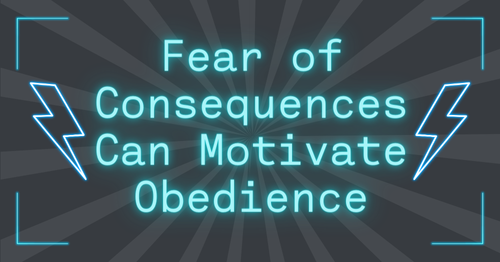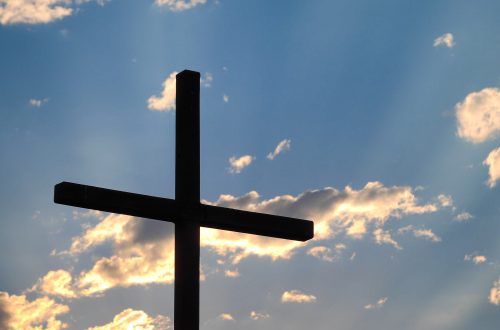
Fear of Consequences Can Motivate Obedience
How do you respond to a command for obedience? What motivates you to obey? Your gut reaction to the word “obedience” is reflected in your attitude toward authority and in the resulting behavior. And this inner reaction certainly affects your relationship with God. Do you trust Him enough to obey His commands, even those that make you personally uncomfortable? “Obedient trust”1 is a huge part of living out our lives as Christians in today’s world. Knowing that our God is completely trustworthy and realistically fearing the consequences of going against Him can motivate you to obedience. Or you can give lip service claiming you are a Christian and then choose to go your own way.
Jesus Told a Parable
The chief priests and elders were questioning Jesus’ authority to teach and to cleanse the temple of all that was against God’s purpose. So Jesus told them a parable in Matthew 21 about authority and obedience. This is what He said in “The Parable of the Two Sons,”
“What do you think? A man had two sons. He went to the first and said, ‘Son, go and work in the vineyard today.’ The boy answered, ‘I will not.’ But later he had a change of heart and went. The father went to the other son and said the same thing. This boy answered, ‘I will, sir,’ but did not go. Which of the two did his father’s will?” They said, “The first.” (Matthew 21:28-31 NET)
Notice the two responses to the father’s command:
- Reluctant obedience. The one who said he would not obey then changed his heart (NIV “mind”) and did what his father asked.
- Lip service and no obedience. This son pretended to obey his father then did not obey what his father asked him to do.
We see both responses in our children as we train them to obey us. We see both responses in ourselves also. Yet even reluctant obedience pleased the father far more than the one who just gave lip service.
Respect for God as our authority and trusting Him will motivate obedience in our hearts. Fear of consequences does also.
Fear as a Motivator
Fear is a gift
Fear is a normal human emotion designed by God to alert us to danger so we will take action against it.
Most teaching about fear considers it bad and always sinful. But fear is a gift. God gave us this gift of fear before sin ever happened. Did you know that?
Look at Genesis 2.
The Lord God took the man and put him in the Garden of Eden to work it and take care of it. And the Lord God commanded the man, “You are free to eat from any tree in the garden; but you must not eat from the tree of the knowledge of good and evil, for when you eat from it you will certainly die.” (Genesis 2:15-17)
Adam and later Eve could daily eat until their hunger was satisfied from every other fruit in the garden. BUT there was one they could not eat because it was dangerous. I am thinking cyanide or strychnine dangerous. This was a healthy fear of a serious consequence that God used to motivate both of them to obedience.
Motivation to take action against the danger
What was the action to take? DO NOT EAT THAT FRUIT!
God designed the emotion of fear so that we would recognize a danger and take action against it. What actions could those be? Flee from it. Stand and fight it. Obey God in doing either. In the garden, the action to take was to obey God and do not eat it.
God Uses Fear to Motivate Us to Obedience
Healthy fear
Did you know that God uses a healthy fear of consequences to motivate us to obedience? The action we take to the threat of consequences can result in sinful behavior or to obedience and greater trust of our great God. Why does God use fear of consequences to teach us obedience? You know the answer to that—people are downright stubborn and prefer to keep on doing evil rather than respond to God’s grace and goodness with obedient trust.
There are many examples of God using fear to motivate people to obedience in the Bible. I have chosen one example—King Hezekiah. His story of fear motivating his obedience is in 2 Chronicles 29-31.
Reaching rebellious “children”
The Old Testament prophet Isaiah lived during the time of King Hezekiah. As Isaiah was writing a song of praise in chapter 26, he said this,
When your judgments [God] come upon the earth, the people of the world learn righteousness. But when grace is shown to the wicked, they do not learn righteousness; even in a land of uprightness they go on doing evil and do not regard the majesty of the Lord. (Isaiah 26:9-10)
Rebellious hearts do not respond to God’s amazing grace and goodness with obedient trust. That was certainly true regarding Israel. God’s people were His children. Like any good parent, God demonstrated His love for His children over and over again—teaching them, providing for them, protecting them, and giving them guidance. Yet, the children rebelled again and again.
Finally, the ones living in the Northern Kingdom called Israel were attacked by Assyria and taken away into captivity. The repercussions of that horrific event reverberated throughout the southern kingdom of Judah. The fear that kind of disaster would happen to Judah motivated the people to finally obey their Father God. They responded this way under the leadership of their godly king, Hezekiah.
Hezekiah Chose Obedient Trust
Hezekiah was twenty-five years old when he became king. His father Ahaz was very wicked. When you trace back the chronology, Ahaz must have been only 12-15 when Hezekiah was born. A teen father. Immature.
Yet, Hezekiah’s mother was the daughter of a very godly man (2 Chronicles 29:1) so Hezekiah’s mother was likely a godly woman. It matters who your mama is! Thankfully, Hezekiah chose to follow his maternal side as a true son of David rather than his paternal influence (2 Chronicles 29:2).
Hezekiah Called Others to Obedient Trust
The religious leaders
Hezekiah’s first priority was to repair and reopen the Temple (ravaged and shuttered by his father). So, he brought together those responsible for maintaining and operating the Temple and the worship of God—the priests and Levites (2 Chronicles 29:4-5). In his challenge to them, Hezekiah rightly held accountable the previous generation of leaders and people for being unfaithful to God, which led to Israel’s captivity (2 Chronicles 29:6, 9).
It was time for a fresh start, and he needed all the religious leaders onboard for this, reminding them of their purpose. He told them to not be negligent now (2 Chronicles 29:11). The priests and Levites then purified themselves and jumped into the task. It took sixteen days to clean the filth from the Temple (2 Chronicles 29:17). 16 days! It must have been a total wreck!
The governmental leaders
Hezekiah then called together all the local leaders and publicly confessed the sins of the nation, just like on the Day of Atonement. His message to them was, “We cleaned the Temple, so now let us get ourselves clean before God.” This was followed by worship through offerings, singing, band playing, reading of the Psalms and hearts filled with gladness (verses 27-31). What a glorious day! The leadership of Judah was going in the right direction at last!
The people
Then, Hezekiah invited all the people of the land, including those Jews left behind in the northern kingdom, to come to Jerusalem to celebrate the Passover (2 Chronicles 30:1-5). This was an attempt to unite Israel into one nation again after 215 years of separation. His letter of appeal said this,
“People of Israel, return to the Lord…that He may return to you who are left, who have escaped from the hand of the kings of Assyria.…Do not be stiff-necked, as your ancestors were;… Serve the Lord your God, so that his fierce anger will turn away from you. If you return to the Lord, then your brothers and your children will be shown compassion by their captors and will come back to this land, for the Lord your God is gracious and compassionate. He will not turn His face from you if you return to Him (2 Chronicles 30:6-9).”
Hezekiah knew the character of God. He was trustworthy. The captives still belonged to God, who still loved them. Returning to the Lord would be an act of obedient trust that God would not bring the consequences on Judah that He had brought on the Northern Kingdom Israel. All those who had lived in Israel knew what happened—those who stayed behind as well as those who escaped to Judah.
Responding to the Invitation to Obedience
You would expect an overwhelmingly positive response to that invitation to trust and obey God, right? This is what happened…
- Some of the people in the north “scorned and ridiculed” the couriers (2 Chronicles 30:10). They didn’t want God’s compassion. That is just plain foolishness. The interesting thing is that they still called themselves Jews. Lip service with disobedience. Just like in Jesus’ parable (Matthew 21:28-31).
- Others “humbled themselves and went to Jerusalem (verse 11).” That’s repentance. That is obedience to God.
As a result, God did this truly amazing thing!
“in Judah the hand of God was on the people to give them unity of mind to carry out what the king and his officials had ordered following the word of the Lord (2 Chronicles 30:12).”
God responded to their trust in Him by giving them unity of mind to be obedient to Him. Unity of mind in a group of people is a miracle in itself. Trust and obey. Obedient trust.
Unity of Mind for Obedient Trust
As a group, the people cleaned Jerusalem of its idolatrous filth that King Ahaz had done to it. Hezekiah prayed for God’s grace upon the people who really didn’t remember how to purify themselves.
“‘May the Lord, who is good, pardon everyone who sets his heart on seeking God…even if he is not clean according to the rules of the sanctuary.’ And the Lord heard Hezekiah and healed the people (2 Chronicles 30:18-20).”
That is grace. That is what God does. We can never really clean ourselves. God cleanses the heart of faith. There was much rejoicing that day, “including the aliens who had come from Israel and those who lived in Judah” (2 Chronicles 30:25).
The aliens were the non-Jews. The New Testament calls them Gentiles! Gentiles joined the assembly of God’s people and were accepted by God that day by faith. This is a foreshadowing of the future. Thank you, God, for your grace because I was once a Gentile!
Obedience Versus Compliance
So, what was the difference this time compared to previous attempts to bring the people back to God? Their response. The people responded with obedience to God, not just compliance to the king’s commands. This is what is recorded in 2 Chronicles 31:1,
“When all this had ended, the Israelites who were there went out to the towns of Judah, smashed the sacred stones and cut down the Asherah poles. They destroyed the high places and the altars throughout Judah and Benjamin [southern kingdom] and in Ephraim and Manasseh [northern kingdom].”
The response to grace was obedience. The people destroyed the idolatrous worship centers that had led them astray. That reminds me of the Ephesian Christians who created a bonfire with all their sorcery books and tools (Acts 19:17-20).
Fear Motivated Their Obedience
Peeling back the layers, why were the people so willing to do this? It was fear—fear of the consequences of continuing their wicked lifestyle. The feared the threat of captivity. They knew what happened to the ten tribes of Israel through the brutality of Assyria and the dragging off of hundreds of thousands of people to who-knows-where as slaves. That was the motivation.
God didn’t want to do that to His people. He sent prophet after prophet to woo His people back to Him. They refused to pay attention. They spurned His grace and His love and His protection.
But His love didn’t end because God gave the people a leader. Hezekiah did what was good and right and faithful before the Lord. The Bible says that in everything he did for the Temple and for restoring God’s law in the land,
“[Hezekiah] sought his God and worked wholeheartedly. And so he prospered (2 Chronicles 31:20).”
He sought God and worked wholeheartedly. Obedient trust. He prospered, and the nation prospered so people had abundance to bring as offerings to the Lord.
“Since the people began to bring their contributions to the temple of the Lord, we have had enough to eat and plenty to spare, because the Lord has blessed his people, and this great amount is left over.” (2 Chronicles 31:10).
We can all learn wisdom from watching the mistakes of others and choosing not to do that! It’s much better to approach life God’s way. In this case, a healthy fear of consequences can motivate selfish people to follow our gracious and good God instead in obedient trust.
Are you willing to obey the Lord God in everything with obedient trust?
As the hymn writer penned,
Trust and obey, for there’s no other way To be happy in Jesus, but to trust and obey.
Then in fellowship sweet we will sit at His feet, Or we’ll walk by His side in the way;
What He says we will do, where He sends we will go; Never fear, only trust and obey.
John H. Sammis, “Trust and Obey” 1887
Read my “1 and 2 Chronicles” blog series to see more examples of when God used fear of consequences to motivate His people to obedience.
1The phrase “obedient trust” was used by Dr. Wayne Braudrick in a sermon delivered at Frisco Bible Church on March 24, 2024.
More Resources:
Reboot Renew Rejoice Bible Study of 1 & 2 Chronicles (download pdf)
Everyday Women, Ever-Faithful God (trusting God with your fears)




